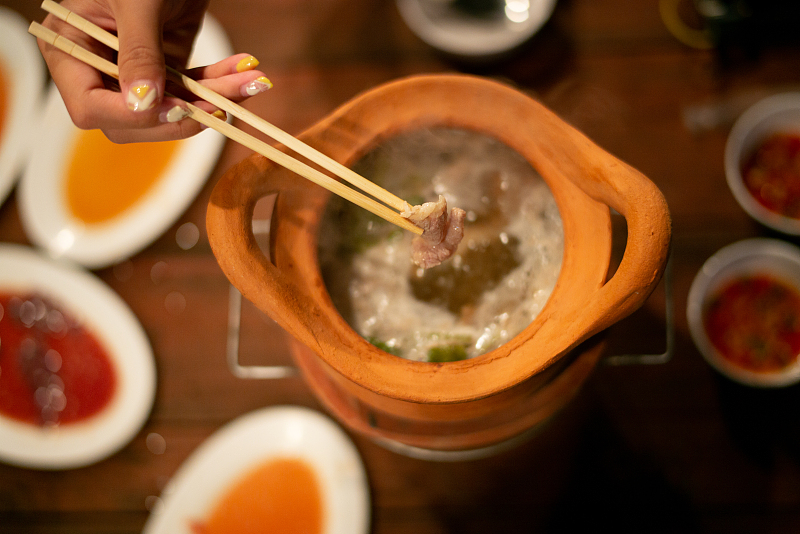A taste of Thai hot pot
- By Mitchell Blatt
 0 Comment(s)
0 Comment(s) Print
Print E-mail China.org.cn, October 30, 2022
E-mail China.org.cn, October 30, 2022

When I arrived in Thailand, I was greeted warmly by friends. One of them invited me to eat Thai-style "Korean barbecue" and hot pot.
The hot pot was neither Korean style nor Chinese. But it was tasty, and the whole experience was a lesson in how culture melds and flows between peoples and nations.
Hot pot is a Chinese dish that includes a pot of boiling broth in which meats and vegetables are cooked by friends sitting around a table. It was popular with China's emperors for centuries. Containers that might have held heated broth have been found in tombs from the Spring and Autumn Period (770-476 BC). The Emperor Qianlong of the Qing dynasty (1644-1911) was particularly fond of hot pot. According to records from the Imperial Household Department, he ate it 200 times in one year.
I can sympathize. It sure is fun to dip food into the boiling water, watch it cook, and then cover it with delicious sauces.
With hot pot's simplicity, its consumption expanded as a food for the masses and reached many countries. Hot pot has different flavors in different places – even within China. The spicy and mouth-numbing broth in Sichuan province is the most famous, while northern Chinese hot pot is less fiery. Usually, the pot is divided in two so that groups can order different flavors of broth.
The broth in the pot simmering on the hot plate in front of me at the Thai restaurant was nothing like the red broth of Sichuan hot pot. The color was a light yellow, while the taste was of lemongrass, basil and lime – like Thai food.
My friend told me that this is called "chim chum." While it can be a little plain on its own, if you want to make it spicy, there is a spicy sauce called "jeaw." Jeaw is the sauce, and the soup is called "jeaw horn" (hot soup) when you add the sauce inside.
My friend poured in the whole bowl, then he added a raw egg, and mixed it up, creating a delicious result.
There are actually two kinds of hot pot in Thailand. Chim chum is the traditional Thai dish, whereby meat is marinated in an oyster sauce mix then cooked in a chicken or pork broth in a clay pot over a fire. It comes from Northern Thailand, but by the time it arrived in urbanized Bangkok, it changed, and it's no longer easy to find a restaurant serving the dish in clay pots. The pot at our restaurant was aluminum, like modern-day Chinese hot pot, but the broth seemed to have many Thai ingredients.
The other kind of Thai hot pot, which has a more direct connection to China, is called "Thai suki." It's not sukiyaki, either, but it took that name in the 1950s, when Japanese culture was extremely popular across Southeast Asia.
Multiple restaurants claim to be the first to have introduced Thai suki to Bangkok. Coca is one such eatery, according to its website. It originally started out as a 20-seat Cantonese restaurant in 1957 that soon expanded to 150 seats and now has multiple locations.
But another restaurant, Number One Suki, says it opened in 1955. There are arguments over the origins of many dishes and beverages, as every chef, bartender and restaurant wants to claim credit. The hazy lines of culinary ancestry are the norm.
Aiken Unni, a scholar at the University of London's Courtauld Institute of Art, said: "You get a lot of these kind of dishes in Thailand – and everywhere, actually. Dishes like this come about from cultures that have contacts with Thailand. They blend local elements with these foreign elements and create these new elements."
Mitchell Blatt is a columnist with China.org.cn. For more information please visit:
http://www.china.org.cn/opinion/MitchellBlatt.htm
Opinion articles reflect the views of their authors, not necessarily those of China.org.cn.
If you would like to contribute, please contact us at opinion@china.org.cn.






Go to Forum >>0 Comment(s)